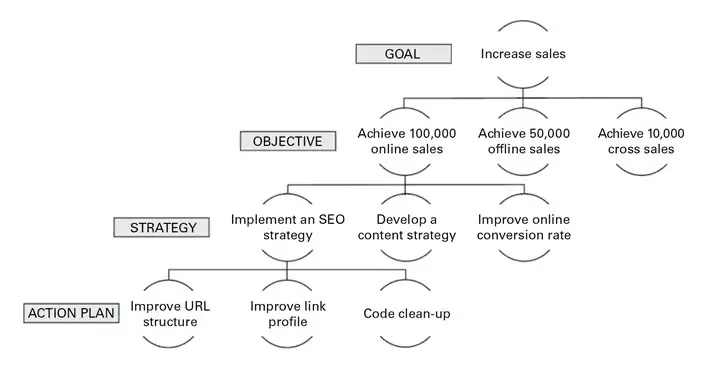Your goals are unique in the planning process in that they require the least detail but the most thought. If your goals are not thought through, then the river will be flowing in the wrong direction. How you go about meeting your goal of ‘increase sales’ is not something that the goal itself is concerned with. You do not need to focus on the ‘how’ at this stage, simply the ‘what’. Your objectives and strategies will deal with how these goals are met. Whilst goals should be grounded, they do not need to be specific or be the result of thorough research. They therefore do not need to be entirely realistic.
It may sound counter-intuitive to have a goal that cannot be met. However, an aspirational goal can drive your business forward faster than a realistic one. That said, there is a careful balance between being aspirational and being so unrealistic that you demotivate your people, which can compromise the delivery of your goal, especially if unrealistic goals are set regularly.
If, for example, your sales goal for the year is 20 per cent above the previous year and the company has never achieved more than 10–15 per cent then this is aspirational. It feels achievable if everyone works hard and you have some luck on your side. This may stretch the team to work towards this, especially if they are incentivized to do this.
Delivering your Goal
If you miss the 20 per cent target but still achieve 17.5 per cent, then this is still the best result your business has ever seen and a good outcome. If, however, you set the target at 40 per cent the following year and 60 per cent the year after, whilst reducing investment in the business, cancelling bonuses, and reducing the workforce, then your people will begin to believe that the targets are unrealistic, and this will seriously demotivate and have a negative impact on productivity. They may also openly criticize the management, which can lead to severe cultural issues and even resignations – all of which will in turn affect the delivery of your goal.

Your objectives are specific, quantifiable, and time-based. They are the steps or milestones that you need to take towards meeting your goal. Many businesses use a SMART approach to creating objectives. SMART is simply a mnemonic that helps us to ensure that the objectives are well thought through and ultimately will serve their purpose. The SMART method has several interpretations, but the ‘SMART’ box below outlines one of the more common ones.
Specific
Specific: no matter who were to look at your action plan it should be clear what needs to be achieved for the action plan to be met. There must be no ambiguity. Using the five ‘W’ questions can help here – again, there are differing interpretations of the five (or sometimes six) ‘W’ questions but below are those that I find the most useful:
–– Who: who will be involved in achieving the action plan?
–– Where: is a specific location involved?
–– What: what exactly needs to be achieved?
–– Why: what is this action plan going to achieve?
–– When: what is the deadline and any milestones along the way?
Measurable
Measurable: how will you know when you have met your action plan?
It is vital that there is a clear measure so that everyone involved knows when the action plan has been hit and there is no confusion. This also allows you to understand how much progress you are making towards meeting your action plan.
Attainable
Attainable: setting action plans that are realistic is crucially important. If your action plans are not attainable then you can never meet them, which ultimately means you can never reach your goals. There is no harm in setting a stretching action plan – and indeed getting the balance between too stretching and too easy is important here. Setting an action plan that does not have this balance right can also cause demotivation amongst the team working on it.
Relevant
Relevant: the action plan needs to be relevant to your goal. Having an action plan that does not tie in with the wider work is not only irrelevant but also a distraction from achieving your goal. Think back to the five W’s above and consider whether each of these are relevant.
Time-based
Time-based: this is where the sixth ‘W’ comes in: ‘When’. Your action plan needs a time frame and also specific milestones. As with any piece of work, having a deadline gives the action plan a much greater chance of being delivered.
References:
blueskynet.ca. (n.d.). Boost your sales with online marketing. Retrieved March 21, 2022, from https://blueskynet.ca/wp-content/uploads/2016/11/online_marketing_eBook.pdf
